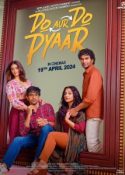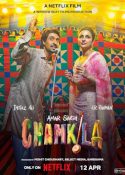 His debut release was 2004’s poignant yet exuberant Kal Ho Naa Ho, which ranks easily as one of the foremost Bollywood films of the decade. Despite the sophomore slump of 2007’s Salaam-e-Ishq in domestic territories, the multi-starrer went on to become an overseas success story. With the much hyped and mixed reviewed Chandni Chowk to China largely rejected by audiences both within India and internationally, in 2009, it was time for Advani to rethink his career trajectory. We at Bollyspice luv love stories. So, it is with delight (and a certain relief), we hear that with Patiala House, Advani is back with what he does best. As the UK schedule of Patiala House comes to an end, we caught up with director Nikhil Advani at his London hotel, just before his return flight to Mumbai. In his trademark casual attire, the thirty-nine year old filmmaker comes across as being at the transitional stage between Bollywood bright young thing and established industry figure. He seems to have learned from his experiences and films and now can say what he wants a film by Nikhil Advani to be. Read on to get some fantastic insight into what that is.
His debut release was 2004’s poignant yet exuberant Kal Ho Naa Ho, which ranks easily as one of the foremost Bollywood films of the decade. Despite the sophomore slump of 2007’s Salaam-e-Ishq in domestic territories, the multi-starrer went on to become an overseas success story. With the much hyped and mixed reviewed Chandni Chowk to China largely rejected by audiences both within India and internationally, in 2009, it was time for Advani to rethink his career trajectory. We at Bollyspice luv love stories. So, it is with delight (and a certain relief), we hear that with Patiala House, Advani is back with what he does best. As the UK schedule of Patiala House comes to an end, we caught up with director Nikhil Advani at his London hotel, just before his return flight to Mumbai. In his trademark casual attire, the thirty-nine year old filmmaker comes across as being at the transitional stage between Bollywood bright young thing and established industry figure. He seems to have learned from his experiences and films and now can say what he wants a film by Nikhil Advani to be. Read on to get some fantastic insight into what that is.
You have given us everything from A Story of a Lifetime in a Heartbeat to Six Different Couples, Twelve Different Lives, One Common Problem, Love. What can audiences expect from your new film Patiala House?
Patiala House is such a diverse film in terms of the layers we are trying to explore. There is a father and son story. There is the story of an immigrant coming to England to work and achieve his dreams. Then there is cricket. There is also a story of a family and generations. Of an older generation trying to hold onto tradition, and a younger generation trying to break free, and attempting to show that by assimilating with the so called western world does not mean you have to give up on Indian values. In Salaam-e-Ishq we had six different stories, but in this we have so much more in terms of desires, wants and characters, though I still haven’t figured out a tagline as yet.
Each of your three films has been very different. As a director, what do you feel is the Nikhil Advani stamp?
I have been in the industry now for sixteen or seventeen years, working myself up from being an assistant director. I made my first film Kal Ho Naa Ho which was considered to be one of the biggest blockbusters, but honestly speaking I used to get very disturbed by young filmmakers putting a film by so and so. Martin Scorsese can say this is a film by Martin Scorsese because you know what to expect when you enter the auditorium. In India I think a filmmaker like Karan Johar or Ram Gopal Varma and Mani Ratnam, can also say this, as they have found their own style or an idiom that they are trying to explore. I think now though with Patiala House I am going to put ‘A Film by Nikhil Advani’, because I feel the film encompasses everything that I want to say as a filmmaker.
 So, what makes this a Nikhil Advani film?
So, what makes this a Nikhil Advani film?
It is an extremely dramatic and emotional piece. I tried running away from the so called loves stories with Chandni Chowk to China and tried to do something completely different. But I realised that the lesson from CC2C, is to come back to what you know best. Patiala House has a lot of, what they call in India, rona dhona, a lot of crying. It is emotional, it is funny, it has got great music, and finally I am going to be able to say this is a film by Nikhil Advani.
The DVD of Kal Ho Naa contains over forty minutes of deleted scenes, Salaam-E-Ishq even had scenes cut after the first prints were released. How do you find the editing process?
I hate editing. I cannot stand it. The two so called processes of filmmaker I can’t stand are writing and editing. Those are the places that creatively sap me and I just burn to a shell. When I am writing I do not know if I am writing the correct stuff; whether I am overwriting, whether I am underwriting. Then when I am editing, I hate seeing the footage I think everything is rubbish and want to reshoot. I hate both those processes but love everything else about filmmaking.
 How was working with Akshay Kumar for a second time?
How was working with Akshay Kumar for a second time?
When making Chandni Chowk to China with Akshay we decided that we wanted to do another film together. I think somehow in my heart of hearts, I wanted to go back to what I knew best. I was uncomfortable making CC2C, so I told him now let me make my kind of film, and he said ok. We were talking about father and son relationships and second chances, so I went away for a couple of months to write. He was gung ho when I went back to him. Akshay and I always want to work together and I don’t think I would like to make a film without him because I think the kind of support he gives to a filmmaker makes you really enjoy the filmmaking process. He says don’t bother about me as the star, I’ll come to the set when you want, you concentrate on making your film. That kind of luxury very few stars give to a filmmaker, so I don’t have to concentrate on whether his car has come, his hotel, is he happy or not with the scene etc. So I would love to keep making films with Akshay Kumar.
How did you decide on the casting of Anushka Sharma?
If I cast anyone else who had already done a film with Akshay, there would always be a certain amount of comparison. What I wanted to do was cast an actor opposite Akshay who could make the character real, so there would be no earlier history. In the case of Anushka, I want people to come in watching an Akshay Kumar film, but I want them to leave thinking about the actual story and their characters. I read somewhere why Adi cast Anushka in Rab Ne Bana Di Jodi, and he said the same thing. He wanted people to go in seeing Shah Rukh but come out seeing Suri. So he cast a fresh face.
 From the theme of Kal Ho Naa Ho, to the Salaam-e-Ishq title track, one of the USP’s of a Nikhil Advani film is the phenomenally successful music. What can we expect from the soundtrack of Patiala House?
From the theme of Kal Ho Naa Ho, to the Salaam-e-Ishq title track, one of the USP’s of a Nikhil Advani film is the phenomenally successful music. What can we expect from the soundtrack of Patiala House?
Considering my pedigree as far as music is concerned, I feel Patiala House is my best work with Shankar-Ehsaan-Loy. I think with Chandni Chowk to China I deviated. But after trying to work with different music directors I figured out that having known S-E-L for twenty years, they literally complete what I am thinking. In the case of Patiala House there are seven songs, including three big Bollywood numbers, and I really think this is their best work in recent times. I would also like to add that the lyrics by Andita Dutt Guptan, who is also the co-writer of the film, are so poignant; she has done a phenomenal job. With the main track ‘Gattu’s Theme’, most people hear it and they start crying. Everywhere we shot from India to Southall, you can’t imagine, people hear the song and they start crying.
You were briefly seen on screen in the classic Kuch Kuch Hota Hai. Will you be making a cameo in front of the camera for Patiala House?
Not at all! I have to lose a couple of kilos and make my six pack, and then we’ll see.
This is one film Bollyspice waits expectantly for, and from Nikhil’s passionate insight into Patiala House we have already marked its Divali release on our calendars. Keep an eye out also for our music review closer to the release date. Is it possible to come up with a more tear jerking piece of music than the title track to Kal Ho Naa Ho? With Shankar-Ehsaan-Loy onboard for ‘Gattu’s Theme’ it seems as though it might just be possible.











